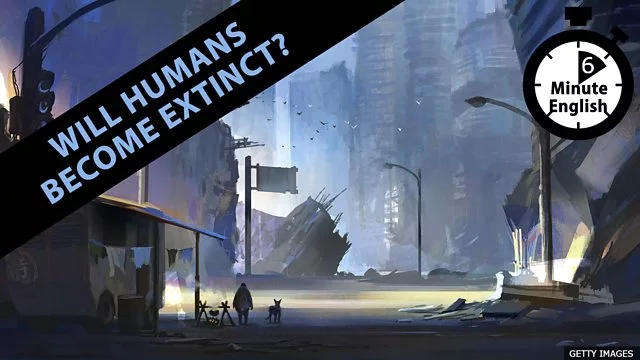پادکست انگلیسی BBC – انقراض بشر
شانس دوام اوردن نسل بشر در قرن 21 چقدره؟ خطرات زیادی بشر رو تهدید میکنه: تغییرات اقلیمی، جنگ اتمی و البته همه گیری که یک نمونه اش رو با کرونا تجربه کردیم. حتی ممکنه که یه شهاب سنگ یا خرده سیاره به زمین برخورد کنه و همه چی یه دفه ای از بین بره. شما در مورد انقراض نسل بشر چی فکر میکنین؟ به نظرتون کدومیک از این تهدیدات ممکنه پایان دنیا باشه؟ (نظر خودتون رو به انگلیسی در بخش دیدگاه با ما در میون بذارید!) در پادکست انگلیسی BBC – انقراض بشر می شنویم که سم و نیل درباره ی آینده و اینکه آیا لازمه از الان دچار واهمه بشیم یا نه صحبت می کنن و در طول مسیر کلمات جدیدی هم آموزش میدن.
سوال پادکست انگلیسی BBC – انقراض بشر :
Which island the dodo was from? Was it:
a) The Galapagos
b) Mauritius
c) Fiji
به پادکست خوب گوش کن تا جواب رو پیدا کنی.
اگر می خوای گوش دادن به پادکست تا حد امکان برات ساده و کارآمد باشه مراحل زیر را دنبال کن:
هر روز به پادکست گوش کن. وقتی براش یه وقت ثابت در روز در نظر بگیری برات تبدیل به عادت میشه و این عادت هرروز پیشرفت میکنه.
پادکستی رو پیدا کن که موضوعش برات جالب باشه. وقتی از خود موضوع لذت ببری یادگیری هم برات لذتبخش میشه.
به پادکستی گوش کن که transcript یا متن داره. این بهت کمک می کنه تا کلمات و عبارات جدید رو به سرعت در متن پیدا کنی و ساختار انواع مختلف جمله رو خوب یاد بگیری.
پس از گوش دادن به پادکست با متن، در مرحله بعدی سعی کن بدون نگاه کردن به متن این کار رو انجام بدی. این کار مهارت شنیداری رو تقویت می کنه و کمک می کنه تا انگلیسی زبانان بومی را راحت تر درک کنی، حتی اگر خیلی سریع صحبت کنن.
اگه به پادکست انگلیسی گوش کردی و نتونستی کامل متوجه اش بشی، ناامید نشو. پادکست هایESL -English as Second Language بیشماری وجود دارن که برای سطوح مختلف، از ابتدایی تا پیشرفته طراحی شدن. مطمئنا هر روز می تونین یه پادکست مناسب با سطح خودت پیدا کنی.
فراموش نکن که هرچی بیشتر تمرین کنی در اون مهارت رشد میکنی! به قول انگلیسی ها: Practice makes perfect
واژگان کلیدی پادکست انگلیسی BBC - انقراض بشر
| معنی به فارسی | معنی به انگلیسی | واژه |
| خطراتی که تهدید کننده ادامه زندگی انسان بر روی زمین هست | dangers that threaten the continuation of human life on Earth | existential risks |
| سوابق و مستندات تاریخی | the collection of all written and recorded past events concerning the human race | the historical record |
| به طور کامل از بین رفتن | completely destroys leaving nothing remaining | wipes out |
| بیماری همه گیر | infectious, epidemic disease | plague |
| روز رستاخیز | final day of the world’s existence; apocalypse | Doomsday |
| هشدار غلط | warning given incorrectly so that people wrongly believe something dangerous is about to happen | false alarm |
BBC 6 minute English -Will humans become extinct

متن پادکست انگلیسی BBC - انقراض بشر
Neil
Hello. This is 6 Minute English from BBC Learning English. I’m Neil.
Sam
And I’m Sam.
Neil
In this programme, we’ll be asking looking at some of the many dangers facing humanity, from climate change and global pandemics to asteroid impacts and nuclear war. We’ll be finding out whether human civilisation can survive these risks and looking at some of the related vocabulary as well.
Sam
Do you really think humans could become extinct and end up as dead as the dodo?
Neil
Ah, so of course you’ve heard of the dodo?
Sam
Yes, dodos were large, metre-high birds which died out in the 1600s after being hunted to extinction by humans.
Neil
That’s right. Dodos couldn’t fly and weren’t very clever. They didn’t hide when sailors with hunting dogs landed on their island. The species was hunted so much that within a century, every single bird had died out. But do you know which island the dodo was from, Sam? That’s my quiz question for today. Was it:
a) The Galapagos
b) Mauritius
c) Fiji
Sam
I’ll guess the Galapagos, Neil, because I know many exotic animals live there. By the way, that’s also cheered me up a bit because as humans we are much smarter than the dodo! We’re far too clever to die out, aren’t we?
Neil
I’m not sure I agree, Sam. Lots of the existential risks - the worst possible things that could happen to humanity, such as nuclear war, global pandemics or rogue artificial intelligence, are human-made. These threats could have catastrophic consequences for human survival in the 21st century.
Sam
That’s true. But existential risks don’t only threaten the survival of the human species. Instead, they could destroy civilisation as we know it, leaving pockets of survivors to struggle on in a post-apocalyptic world.
Neil
And it wouldn’t be the first time that has happened, as the BBC World Service programme The Inquiry found out. Simon Beard of the Centre for the Study of Existential Risk at Cambridge University explains:
Simon Beard
The historical record suggests that about once every thousand years an event occurs that wipes out about a third of the human population – so in the Middle Ages, this was the Black Death - huge plague that covered Eurasia, while there was also dramatic global cooling at that time which many people think was related to volcanic eruptions and about a third of the global population died.
Sam
So, humanity has been facing these risks throughout history, according to the historical record – the collection of all written and recorded past events concerning the human race.
Neil
Yes. Wars and plagues –infectious, epidemic diseases which spread between countries can quickly wipe out – or completely destroy, millions of people.
Sam
And there’s not much we can do to stop disasters like that!
Neil
True, Sam, but what about individuals who actively work to bring about the end of the world - like apocalyptic terrorists, rampage shooters and fundamentalist cults like those who organised the poisonous gas attack on the Tokyo subway.
Sam
Those are people who want to end human life on Earth and bring about Doomsday - another word for the final, apocalyptic day of the world’s existence.
Neil
Right. And things got even scarier in modern times with the invention of nuclear weapons. During the Cuban Missile Crisis between America and the USSR for example, risk experts estimated a 41% probability that human life would be completely wiped out! Seth Baum of New York’s Global Catastrophic Risk Institute explains how human error almost brought about Doomsday:
Seth Baum
There are some ways that you could get to a nuclear war without really intending to, and probably the biggest example is if you have a false alarm that is mistaken as a nuclear attack, and there have been a number of, maybe even very serious false alarms, over the years, in which one side or the other genuinely believed that they were under nuclear attack, when in fact they were not at all under nuclear attack.
Sam
One such false alarm - an incorrect warning given so that people wrongly believe something dangerous is about to happen, came about in 1995, when the US sent missiles up into the Earth’s atmosphere to study the aurora borealis, the northern lights.
Neil
Soviet radars picked up the missiles, thinking they were nuclear warheads and almost retaliated. Nuclear Armageddon was only averted by the actions of one clear-thinking Russian general who decided not to push the red button
Sam
Phew! A close shave then! Well, Neil, all this doomongering has made me want to just give it all up and live on a desert island!
Neil
Like the dodo eh, Sam? So, which island would that be? If you remember, today’s quiz question asked where the dodo was from.
Sam
I said The Galapagos.
Neil
And I’m afraid to say it was b) Mauritius. So, to recap, in this programme we’ve been discussing Doomsday – the final day of life on Earth and other existential threats - dangers threatening the survival of humans on the planet.
Sam
We looked back throughout the historical record - all recorded human history, to see examples of threats which have wiped out, or killed millions of people in the past, including wars and plagues which spread epidemic diseases between populations.
Neil
And we’ve seen how modern dangers, like nuclear war and climate change, further reduce the probability of human survival. But Sam, it’s not all doom and gloom! The same scientific intelligence which spilt the atom could also find solutions to our human-made problems in the 21st century, don’t you think?
Sam
So, the end of the world might be a false alarm – or unfounded warning – after all!
Neil
Let’s hope we’ll all still be here next time for another edition of 6 Minute English. Bye for now!
Sam
Bye.
امیدوارم از پادکست انگلیسی BBC - انقراض بشر لذت برده باشید.
گوش دادن به پادکست روش خوبی برای تقویت مهارت شنیداری و هم چنین یادگرفتن کلمات در بستر یک موضوع خاصه که این به تقویت مهارت مکالمه انگلیسی نیز کمک زیادی می کنه.
اگه تو هم از اون آدمهایی هستی که از گوش دادن به پادکست لذت می بره برات یه خبر خوب دارم! آموزشگاه زبان انگلیسی 24talk یه دوره طراحی کرده مبتنی بر پادکست و داستان کوتاه به اسم "پادکستوری - Podcastory". این دوره سعی کرده یادگیری زبان انگلیسی رو مناسب با نیاز و سطح زبان آموز به یه فرایند بسیار مفرح، موثر، سریع و کم هزینه تبدیل کنه.
همین الان می تونی با کلیک روی عکس زیر و ثبت نام در دوره ی آموزش زبان انگلیسی با پادکست و داستان ۲۴talk اولین و مهم ترین قدم رو برای یادگیری زبان انگلیسی برداری. وقت رو از دست نده!









2 comments